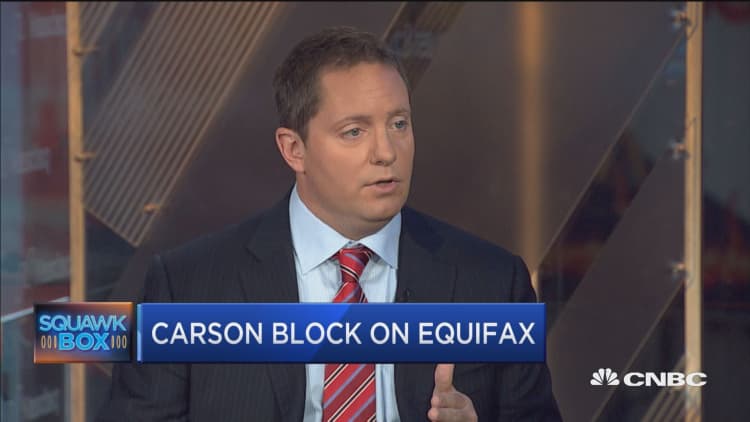
Short-seller Carson Block told CNBC on Monday that his lawsuit against Equifax over its massive cyberbreach is a personal case, and he's seeking at least $500,000 in damages.
"This is really on my behalf, since apparently my data ... may have been compromised," said Block, founder of Muddy Waters Research. "I'm suing."
Block filed a private lawsuit against the supplier of consumer credit information on Friday.
While blasting the failures of the supplier of consumer credit information, Block said on "Squawk Box" his firm does not hold a short position in Equifax. He said he was too late and there are too many unknowns. Short selling is a practice in which traders can bet against a company by selling shares they don't own and buying them back at a lower price.
But Block said investors will punish Equifax shares further if liabilities become massive.
The stock has tanked about 35 percent since the company revealed on Sept. 7 that a data hack could potentially affect 143 million consumers in the United States. Equifax said it discovered the intrusion on July 29. "Criminals exploited a U.S. website application vulnerability to gain access to certain files," the company said.
Block said that when a massive data breach such as Equifax's happens, company executives usually get canned but get some kind of golden parachute. Executives will change "when their stock prices go down and they personally lose money," he added.
Since the breach was announced, two top executives have retired. Equifax CEO Richard Smith, is expected to testify on Oct. 3 before a House panel, and Sen. Elizabeth Warren, D-Mass., has begun an investigation. Along with 11 other fellow Democratic senators, she also plans to introduce a bill to give consumers the ability to place a security freeze on their credit accounts for free.
Nearly 40 states are looking into the Equifax hack as well.
In a statement to CNBC, an Equifax spokesperson said in part: "We cannot comment on pending litigation, but want to reassure consumers that we are remaining focused on helping them to navigate this situation and providing the best customer support possible."


